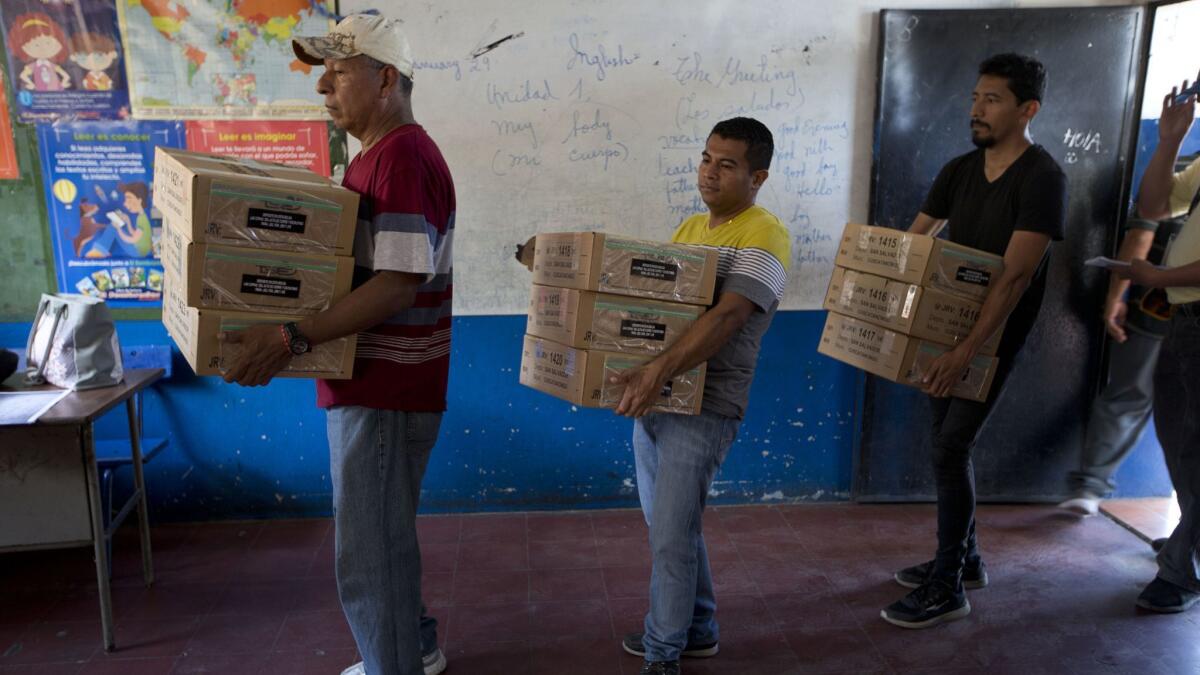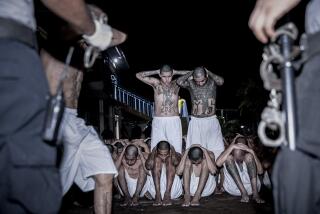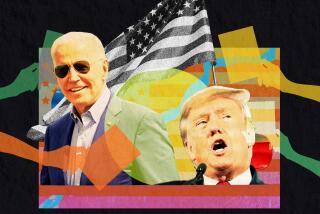El Salvador goes to the polls on Sunday to elect a new president

A 37-year-old populist campaigning on an anti-corruption platform and hoping to bring an end to El Salvador’s two-party rule is the leading candidate as voters go to the polls here Sunday to elect a new president.
Nayib Bukele, a social media darling and the former mayor of San Salvador, has won over disaffected voters from the country’s two dominant political parties, which have been tarnished by accusations of graft.
While critics call him an enigma because he has ducked interviews and public debates and professes to have no political ideology, Bukele’s supporters view him as an outsider who will bring change to a corrupt system.
“He looks like he is a transparent person, and transparency is the number one thing we want in El Salvador,” said Juan Ramos, 52, a street vendor in San Salvador who supports Bukele: “No more corruption, no more theft.”
A poll conducted by the José Simeón Cañas Central American University in San Salvador showed Bukele leading with 44% of the vote. He is running with the Great Alliance for National Unity, known as GANA, a small party on the far right.
His closest rival, with 20% in the poll, is business tycoon Carlos Calleja of the right-wing Nationalist Republican Alliance, known as Arena.
Calleja, whose family owns the largest chain of supermarkets in El Salvador, has vowed to create jobs and has the support of much of the country’s business community.
Trailing in third, with 11%, is Hugo Martinez, a former congressman and foreign minister with the leftist Farabundo Marti National Liberation Front party, known as the FMLN. Martinez has promised to expand access to healthcare and education.
None of the candidates have spent much time talking about the major issues facing El Salvador: gang violence, unemployment and the exodus of Salvadorans to the U.S. Another “caravan” of migrants is planning to depart Thursday.
Whoever wins will have an impact on the U.S. Roughly 20% of Salvadoran citizens live in the U.S., and remittances make up around 17% of El Salvador’s economy. President Trump has moved to end temporary protected status for around 200,000 Salvadorans living in the U.S., placing them at risk of deportation.
Candidates from either Arena or the FMLN, the party of El Salvador’s former leftist guerrillas, have won each presidential election since the 1992 peace accords ended the country’s decades-long civil war. President Salvador Sánchez Cerén, of the FMLN, is deeply unpopular and has been viewed as ineffective and removed from everyday Salvadorans. He is not eligible to run for a second consecutive term.
Both parties have been tainted by high-profile corruption scandals.
Mauricio Funes of the FMLN, who led the country from 2009 to 2014, was convicted of embezzlement and is now living in Nicaragua, where he was granted asylum after claiming political persecution.
Arena’s Tony Saca, president from 2004 to 2009, pleaded guilty to embezzling hundreds of millions of dollars and is currently in prison.
Francisco Flores, another Arena politician who served as president from 1999 to 2004, died while facing charges that he had diverted $15 million in earthquake relief funds to his personal and political accounts.
“People are fed up, disgusted by the corruption, and looking for an alternative,” said Eric Olson, a consultant at the Wilson Center, a Washington-based think tank. “And that is where Bukele has effectively positioned himself — as the new voice.”
Bukele projects a youthful image with his preferred outfit of leather jacket, jeans and colorful socks. He sometimes shows up to news conferences wearing a backwards baseball cap. He has embraced social media and has more than 1 million followers on Facebook, a huge number in a country of 6.4 million.
He has vowed to create jobs by building a new airport in impoverished eastern El Salvador and reviving a train line that crisscrosses the small country — without saying how he would pay for either. He has pledged to invite the United Nations to to investigate graft in El Salvador and often repeats a campaign slogan that there would be enough money in El Salvador if the country’s leaders didn’t rob it.
The scion of a prominent business family, Bukele began his political career in 2012 with the FMLN, as mayor of Nuevo Cuscatlan, a small town outside the capital city. Three years later, he was elected mayor of San Salvador, where he was best known for helping to transform the city’s historical center, which had been overrun by warring gangs and is now freshly populated by bars and coffee shops.
In 2017, Bukele’s frequent criticism of the FMLN led to his expulsion from the party. Now that he is running with the far-right GANA, questions have been raised about his politics, ones he has largely avoided by skipping presidential debates and refusing most media interviews.
Johnny Wright, a former congressman with Arena and a Bukele critic, said his strategy appears to be a combination of being part unambiguous yet part undefined.
“When you look at his very astute and deliberate presence in social media, he cleverly — almost in the same fashion as Donald Trump — sets the public agenda through his tweets.”
Rubén Zamora, a former ambassador to the U.S. under the FMLN, described Bukele as a narcissist.
“The only thing he cares about is being president,” Zamora said. “He has a vision of saving the country, of being Jesus Christ.”
Zamora said none of the candidates would appear to offer a radically different approach to El Salvador’s current stance toward the U.S., which could be best defined as playing nice and ignoring Trump as much as possible.
“All three candidates will maintain more or less the same attitude to the U.S., which is no confrontation,” Zamora said.
Green is a special correspondent. Times staff writer Kate Linthicum contributed from Mexico City.
More to Read
Sign up for Essential California
The most important California stories and recommendations in your inbox every morning.
You may occasionally receive promotional content from the Los Angeles Times.










